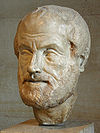- Ousia
-
For other uses, see Ousia (disambiguation).
Part of a series on Aristotelianism  IdeasCorrespondence theory of truth
IdeasCorrespondence theory of truth
hexis
virtue ethics (golden mean)
four causes
telos
phronesis
eudaimonia
arete
temporal finitism
antiperistasis
nature
potentiality and actuality
universals (substantial form)
hylomorphism
mimesis
substances (ousia) and accidents
essence
category of being
magnanimity
sensus communis
rational animal
genus-differentia definitionInfluences and followersPlato
Alexander the Great
Theophrastus
Avicenna
Averroes
Maimonides
St. Thomas Aquinas
Alasdair MacIntyre
Martha Nussbaum Philosophy portal
Philosophy portalOusia (Οὐσία) is the Ancient Greek noun formed on the feminine present participle of εἶναι (to be); it is analogous to the English participle being, and the modern philosophy adjectival ontic. Ousia is often translated (sometimes incorrectly) to Latin as substantia and essentia, and to English as substance and essence; and (loosely) also as (contextually) the Latin word accident (symbebekós).[1][2]
Contents
Philosophical and scientific use
Aristotle defined protai ousiai, or “primary substances”, in the Categories as that which is neither said of nor in any subject, e.g., “this human” in particular, or “this ox”. The genera in biology and other natural kinds are substances in a secondary sense, as universals, formally defined by the essential qualities of the primary substances; i.e., the individual members of those kinds.[3]
Much later, Martin Heidegger said that the original meaning of the word ousia was lost in its translation to the Latin, and, subsequently, in its translation to modern languages. For him, ousia means Being, not substance, that is, not some thing or some being that "stood"(-stance) "under"(sub-). Moreover, he also uses the bi-nomial parousia-apousia, denoting presence-absence, and hypostasis denoting existence.[citation needed][clarification needed]
Theological significance
New Testament
The word ousia is not used in the New Testament except in relation to the substance in the sense of goods twice in the parable of the Prodigal Son where the son asked his father to divide to him his inheritance, and then wasted it on riotous living.[4][5]
Early Christianity
Origen (d. 251) used ousia in defining God as one genus of ousia, while being three, distinct species of hypostasis: the Father, the Son, and the Holy Spirit. The Synods of Antioch condemned the word homoousios (same substance) because it originated in pagan Greek philosophy. The Catholic Encyclopedia entry for Paul of Samosata states:
- It must be regarded as certain that the council, which condemned Paul, rejected the term homoousios; but, naturally, only in a false sense, used by Paul; not, it seems, because he meant by it a unity of Hypostasis in the Trinity (so St. Hilary), but because he intended, by it, a common substance, out of which both Father and Son proceeded, or which it divided between them — so St. Basil and St. Athanasius; but the question is not clear. The objectors to the Nicene doctrine in the fourth century made copious use of this disapproval of the Nicene word by a famous council.[6]
The generally agreed-upon meaning of ousia in Eastern Christianity is "all that subsists by itself and which has not its being in another"[7] - in contrast to hypostasis, which is used to mean "reality" or "existence".[8]
In 325 the First Council of Nicaea condemned Arianism and formulated a creed, which stated that in the Godhead the Son was Homoousios (same in substance) of the Father. However, controversy did not stop and many Eastern clerics rejected the term because of its earlier condemnation in the usage of Paul of Samosata. Subsequent Emperors Constantius II (reigned 337-361) and Valens (reigned 364-378) supported Arianism and theologians came up with alternative wordings like Homoios (similar) homoiousios (similar in substance), or Anomoios (unsimilar). While the Homoios achieved the support of several councils and the Emperors, those of an opposing view were suppressed. The adherents of the Homoiousios eventually joined forces with the (mostly Western) adherents of the Homoousios and accepted the formulation of the Nicene creed.
See also
- Consubstantial
- Duns Scotus
- Essence-Energies distinction
- Haecceity
- Hypokeimenon
- Noumenon
- Ontic
- Physical ontology
- Quiddity
References
- ^ Philosophical Dictionary: Erasmus-Extrinsic
- ^ Commentary on Aristotle's Physics
- ^ Cohen, S. Marc (2004). "Lecture on Categories". http://faculty.washington.edu/smcohen/433/catlec.htm. "Primary substances are fundamental in that “if they did not exist it would be impossible for any of the other things to exist”. [Categories, 2b5]"
- ^ Thomas Mozley The creed or a philosophy 1893 p303 "III 'OUSIA' IN THE NEW TESTAMENT The only appearance of this word in the New Testament is in two successive verses of the Parable of the Prodigal Son. It there designates first the 'living' which the Prodigal Son compelled his father..."
- ^ Luke 15:12-13 Greek
- ^ http://www.newadvent.org/cathen/11589a.htm
- ^ St John Damascene gives the following definition of the conceptual value of the two terms in his Dialectic: Ousia is a thing that exists by itself, and which has need of nothing else for its consistency. Again, ousia is all that subsists by itself and which has not its being in another.Pg 50 The Mystical Theology of the Eastern Church, by Vladimir Lossky SVS Press, 1997. (ISBN 0-913836-31-1) James Clarke & Co Ltd, 1991. (ISBN 0-227-67919-9)
- ^ Hypostasis meaning existence in general Pg 51 The Mystical Theology of the Eastern Church, by Vladimir Lossky SVS Press, 1997. (ISBN 0-913836-31-1) James Clarke & Co Ltd, 1991. (ISBN 0-227-67919-9)
Bibliography
- Leo Donald Davis, The First Seven Ecumenical Councils (325-787): Their History and Theology, Liturgical Press, 1983. (ISBN 0-8146-5616-1)
- Martin Heidegger, Being and Time.
- Vladimir Lossky The Mystical Theology of the Eastern Church, SVS Press, 1997. (ISBN 0-913836-31-1) James Clarke & Co Ltd, 1991. (ISBN 0-227-67919-9)
External links
Categories:- Philosophical terminology
- Trinitarianism
- Greek loanwords
- Christian theology
- Christian terms
- Hellenism and Christianity
Wikimedia Foundation. 2010.
